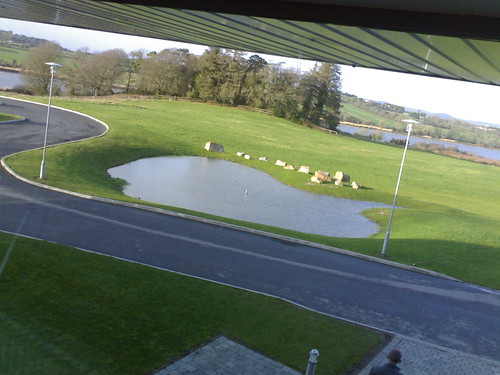28 January 2007
IE TLD domain registration
Michele Neylon comments on issues facing top level domain registrars IE Namespace: We Need Personal Domains!
Circle ID says of him: "Michele Neylon is MD of an Irish hosting and domain registration company.
He is also involved with the Irish Internet Association (http://www.iia.ie ) and the ISP Association or Ireland (http://www.ispai.ie ).
He currently sits on the enum353 policy advisory board where he acts as the Irish Internet Association's representative."
I have tended to avoid .ie domains myself (and for my work) as the process was too cumbersome, and paper-bound, and also more expensive than ".net",".org" or even ".com" if you could find a free name. Perhaps these initiatives in the IEDR will make it easier for us to use ".ie" for our domains in future... Good luck with it!
WiFi standards
In this interesting post George Ou laments the lack of 802.11a uptake, and blames optimistic hype around 802.11n - it's a very good summary of the history of unlicensed bandwidth WiFi.
802.11n - The consequences of abandoning the 5 GHz frontier by ZDNet's George Ou -- When 802.11b first started getting popular in late 2000, no one imagined that it would still be the most dominant standard 6 years later and continue to dictate the design of the latest wireless LAN products because it is the lowest common denominator. As with any technology that is first to reach critical mass, it [...]
26 January 2007
Threads Considered Harmful
This got me thinking: O'Reilly Radar > Threads Considered Harmful
It does make sense to try and avoid explicitly managing threads, just as it does to avoid explicitly managing memory. It's just a matter of when the technology tools can catch up with what that ought to be able to do....
Nerd Scores
So I score less than Shane R was right, I'm a machine enthusiast (Ordo Ab Chao)
Umm, not sure what that tells us....
Three Open Source Projects
Paul Watson cites Linux, Apache and Mozilla as the three main open source projects Life is grand » The Three, on a thread started with O'Reilly's Nat Torkington who asked what the three most important open source projects were.
This reminds me of the old argument about whether Linux should be called GNU/Linux, as Linux is actually just the kernel, and what makes it a great platform is all of the other software that can use the kernel (like the GCC compiler, and even the "ls" command to list files, and the "bash" shell to type built-in commands). So if I could modify Linux to GNU/Linux I'd agree. One might also think of sendmail which helped provide the other major Internet service that drove the adoption of the Internet outside academia - email.
BarCamp SouthEast

View from Southeast Barcamp on Flickr - Photo Sharing!
Well I am really sorry that I missed an event hosting in my own building BarCamp SouthEast!!!! That's the breaks when schedules don't work out. I was triple booked last Saturday, and with a one year old daughter, family comes first at the weekends.
So sorry to all the cool presenters who came to the TSSG building (or to use the new name the ArcLabs Research & Innovation Centre, that is a abstract concept encompassing the TSSG research guys, and related innovation activities in WIT including the Centre for Entrepreneurship).
I was glad to see that the event had a good web/RSS/Atom presence, and I saw loads of photos of places I recognise, including this one from Bernie Goldbach, here's a list of Photos on Flickr tagged with BarCamp and SouthEast.
21 January 2007
ICANN have started a blog!
Famous for not being open with certain types of information, perhaps ICANN are turning the corner with their new blog ICANN Blog.
The second post announces the public release of an Annual Report 2005-2006 (PDF)
IPv6 and Security and QoS
Here's a good ComputerWeekly article on IP Security: IPv6 offers data packet security and quality of service - but so does IPv4 - 17/Jan/2007 - ComputerWeekly.com
They're right to point out that IPsec can be used with IPv4 as well as IPv6.
15 January 2007
iPhone
I'll hold my fire on the iPhone hype to see how it all works out in practice. I'm a big Apple fan, and a MacBook Pro user, but I'm very happy with my Sony Ericsson P990i for now, and I'll decide whether to move to a new handset or not as the occasion arises. What is strangest for me is the move to using the finger as the pointing decice. On the P990i I use the stylus for writing letters as input, and I can do this very quickly, I cannot see the finger replacing the pen (whilst not as old as the finger, it certainly has a venerable history as a human interface tool) any time soon!
Sun releases Fortress as open source (Fortran replacement)
Sun's Fortran replacement goes open-source | Tech News on ZDNet
It is interesting that Fortress is effectively an update of Fortran, focusing on parallel processing capabilities. There's a big buzz around Grid Computing in general, and the open source availability of this tool could help provide more programs that can make use of Grid infrastructures - I have always found that the main bottleneck for grid/parallel computing has been parallelising the algorithms for problems.
Sun Microsystems took a new open-source step this week, enlisting the outside world's help in an attempt to create a brand-new programming language called Fortress.
On Tuesday, the company quietly released as open-source software a prototype Fortress "interpreter," a programming tool to execute Fortress programs line by line. "We're trying to engage academics and other third parties," Eric Allen, a Sun Labs computer scientist and Fortress project leader, said about the open-source move.
Fortress is designed to be a modern replacement for Fortran, a programming language born 50 years ago at IBM but still very popular for high-performance computing tasks such as forecasting the weather.
Even though Fortress grew out of a Defense Department-funded supercomputing project, it tackles a mainstream computing challenge, too: more easily extracting work from all those new processing engines appearing in multicore processors.

